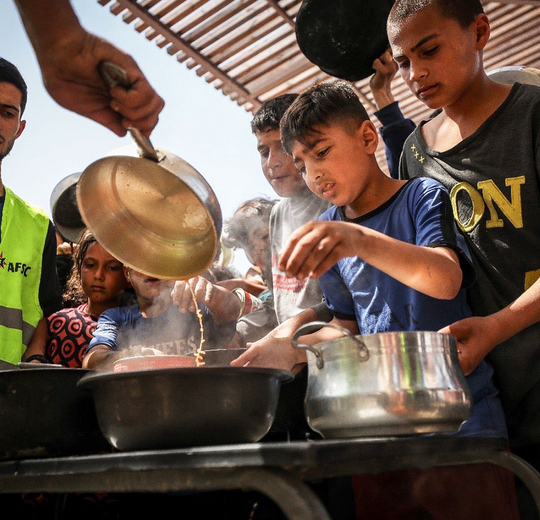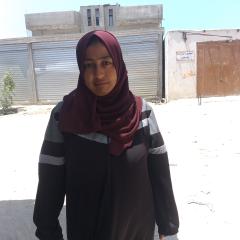My name is Nidaa Zaki Abu Toha, I am 33 years old. Our dream is to get food and water daily, to return to our house in Al Shati refugee camp west of Gaza City, and to be able to rebuild our house. I dream of educating my children and creating a beautiful future for them.

There is no water in the shelters. All the water wells in the UNRWA schools and Palestinian government schools, which have become shelters for tens of thousands of displaced people, are not functioning. There is barely any fuel. The Rafah and Karim Abu Salem crossings, which were used to transport fuel to operate our water wells, are closed. The only operating well is in Khan Younis city, where I, displaced, now live. I go to the well every day to fill a 20-litre gallon of water. This is a daily challenge. I can handle hunger, but I need water to survive, maintain hygiene, and cook.
Under normal circumstances, my family’s daily water requirement is about 20 litres per person. Today, I share 20 litres of water among 23 family members. We make great efforts to conserve water, as we do not have our own bathroom. We live in a tent for the displaced, and we use a public bathroom, which lacks cleanliness and water, but we are forced to live this way. We face a continual threat of disease, with no way to combat it due to the water shortage.
I have two children, Saif al-Din al-Masri, 12 years old, and Adam al-Masri, three-and-a-half years old. I divorced my husband three years ago, and I live in a small room with my children in my family’s house in Shati refugee camp west of Gaza City. Before the war, I searched extensively for a job to support my children, but I couldn’t find one. There are no job opportunities in the Gaza Strip. Most of the population suffers from extreme poverty.
My family’s displacement journey began on Tuesday, 7 November 2023, after the Israeli bombardment intensified on Shati refugee camp. On the fifth day of the Israeli occupation’s ground operation in the Gaza Strip, the Israeli incursion focused on Gaza City and the northern Strip, bombing dozens of buildings adjacent to my family’s house, and forcing us to leave our refugee camp under heavy bombardment.
I ran with my son Saif al-Din, gripping my youngest, Adam. I tried to protect them from the scattered Israeli shelling. There was shrapnel everywhere. The occupation forces asked us to head to the southern areas of the Gaza Valley, and my father decided that we would evacuate to Khan Younis city. We walked long distances on foot as the occupation stopped the entry of fuel and petroleum on 7 October 2023, preventing us from being able to use a car. The walk is 40 kilometres [24.8 miles] from our home in Shati refugee camp.
My father bought a small tent for us and placed it near the Nasser Medical Complex in Khan Younis city. We stayed there for over a month. We fled again under bombardment after the occupation invaded Khan Younis city at the beginning of December 2023. We were horrified by how close the occupation’s tanks were to us, but we miraculously escaped from them while raising white flags.
We then fled to Rafah city, where we stayed in tents, then returned to Khan Younis city a week after the occupation invaded the eastern areas of Rafah city. We are still living in tents. The war is ongoing, and we are still deprived of living in our home.
The third day of January 2024 will remain etched in my mind forever. On this day, the occupation forces bombed my family’s house in the Shati refugee camp and destroyed it. I lived in this house with 23 family members, and today we are all displaced, living in tents. Our lives were tied to our house and living in Shati refugee camp, but now, for the seventh month, we are strangers to our home. We suffer from a lack of the necessities of life.
Thirteen children lived in my father’s house, all under the age of ten. They are now living in difficult conditions in tents. Their crying continues throughout the day. We can barely provide a meal for them, and even the meal we provide is insufficient and unsatisfactory for them. We live on aid, and the aid we receive is very limited. The conditions of the displaced in the tents are extremely difficult.
In our home, we had four bathrooms. Today we have none. We live in a tent, and when we need to use the bathroom, we go to the schools set up as shelters for displaced people. We line up in long queues to enter bathrooms with no water. I am afraid for myself and my children. I am afraid of diseases and the spread of epidemics due to the health hazards and waste everywhere in the Gaza Strip.
We currently live in a tent near the Sheikh Jameel School, which belongs to UNRWA in Khan Younis city. We are exposed to the danger of bombing at all times.
My family, like all families in the Gaza Strip, has suffered from the loss of many family members. My cousin’s son was martyred while he was in a barber shop near the Israa School in the Shati refugee camp. He wanted to cut his hair, but the occupation deprived him of his life while he was waiting for his turn in the barber shop. In this assassination, dozens of others were also martyred and injured.
The occupation bombed my uncle’s house, and his wife, Abeer Abu Toha, 42, was martyred in the bombing, as well as his son Ahmed Abu Toha, 14, and his grandson, the child Ahmed Heid, who was two-and-a-half years old. The occupation killed them in a heinous crime, destroyed their house completely, and my uncle’s children lost their mother forever.
The occupation’s crimes are not limited to my family alone. The occupation has ruined all Palestinian homes. Many of my friends, neighbours, and relatives have been killed. Many of my son Saif al-Din’s classmates have been killed. Many children that were the same age as my 3-year-old son Adam have been killed, and some even younger than him. The occupation has committed hundreds of crimes during its more than seven-month long continuous war on the Gaza Strip. The Israeli war machine continues to kill more innocent people.
My son Saif al-Din lost both his cousin and his friend Ahmed as martyrs during the war. My son used to play with Ahmed every day and loved him dearly. Saif al-Din can’t stop remembering him and mourning him. He continues to cry whenever he remembers him and asks me, “Why did the occupation kill my friend Ahmed? What did Ahmed do to the occupation to be killed?” The occupation’s crimes have affected all inhabitants of the Gaza Strip.
My children wake up terrified from the sound of bombing. We live in a cloth tent, and our lives are at risk all the time, especially from shrapnel that falls during nearby bombings. Recently, shrapnel fell on our tent. I tried to calm my children down and tell them that the bombing is far away, but they hear the sounds all the time. The bombing has not stopped in the Gaza Strip since the beginning of the war.
My son Adam was supposed to start kindergarten next year, but now he helps us carry water and gather food distributions. The occupation deprived my children of their childhood and deprived them of living in safety and peace. My children only get one meal a day. They sleep all day hungry, but this is the situation for all the inhabitants of the Gaza Strip.
Our dream is to get food and water daily, to return to our house in Shati refugee camp and to be able to rebuild it. I dream of educating my children and creating a beautiful future for them. My children fled from Khan Younis city in front of the occupation tanks and under intense bombing. My only wish is for the war to stop and for us to return to our lives, for Gaza to be rebuilt, and for us to live in peace and security like the rest of the world’s population.
Take action now
Tell Congress to demand lifesaving aid for Gaza
The humanitarian crisis in Gaza has reached catastrophic levels. Since March 2, 2025, Israel—with full support from the U.S.—has severely restricted food, water, medicine, and humanitarian aid from entering Gaza.
Contact
If you have questions or concerns, please contact us at gazaunlocked@afsc.org.


